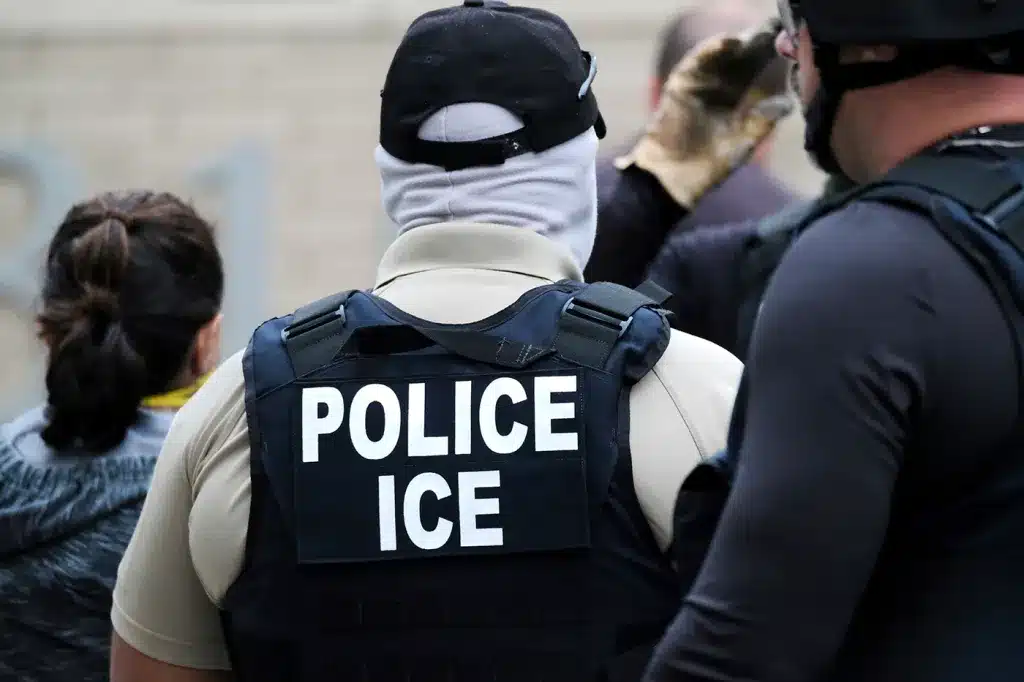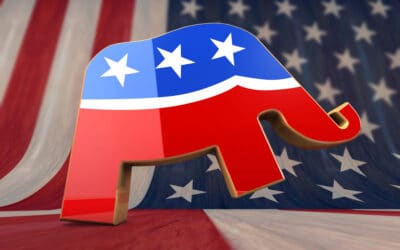Immigration control strikes at the heart of the rule of law. That fact is badly unappreciated, even by some libertarians. If for no other reason, people who cherish individual liberty ought to be appalled by what the Trump administration is up to. Trump did not invent this unequivocal assault on a key protector of freedom—blame Congress for that—but never has the assault been so flagrant in America.
To see this, let’s look at libertarian political philosopher Jacob T. Levy’s 2018 article “The Rule of Law and Risk of Lawlessness.” Levy wrote the article in response to the intensification of so-called border protection in the early days of the first Trump term, when children were separated from their parents and locked in cages. (Levy and Nathan Goodman recently discussed immigration and the rule of law in this Mercatus Center podcast.)
Levy begins his article by getting down to the basics of how freedom is protected in the classical-liberal tradition. This is a crucial point because it goes to the essence of the term limited government.
In public law and politics, the core meaning of the rule of law is this: that the executive branch of the government, in control of the violent agencies of state power and the tools of punishment, shall not use them lawlessly. It shall not imprison, execute, or otherwise punish except in accordance with prospective, promulgated law and trial conducted through fair and regular procedures. The writ of habeas corpus is the most famous instantiation of this value in the Anglo-American tradition, with medieval roots that early modern, protoliberal Whigs exaggerated into a full-blown centuries-old legal rule.
Liberty is not protected by magic or by abstractions. Protection requires concrete institutions and procedures to preclude arbitrary power. That is, it requires that politicians, judges, bureaucrats, and armed agents do and not do particular things. That’s what we mean by the rule of law.
Citing Montesquieu’s original and radical formulation of the classical-liberal approach to liberty-protecting governance, Levy notes that the rule of law importantly “included a separation of powers that distinguished judicial trial from executive punishment and an understanding of liberty as security from extrajudicial punishment…. [T]he key insight was that despotic states punish people even though they have broken no law, or never been properly convicted of it.” A separation of powers implies checks and balances.
Montesquieu heavily influenced America’s founders. Limitations and flawed implementation notwithstanding, we must credit the group of men who aimed at what John Adams called “a government of laws, not men.” That had to be better than regimes of the past and future, such as those in Nazi Germany and Soviet Russia, in which the rule of law was not the objective. Despite some egregious exceptions, the rule of law has served us well. We would do well to understand that.
As Levy points out, critics miss the mark when they claim that rule-of-law procedures would be consistent even with bad law. Drawing on the theorists Lon Fuller and Judith Shklar, Levy responds, “This is not how terror states and totalitarian regimes function. They deliberately leave their whole populations at the mercy of the executive with its police, secret police, and paramilitary agencies.”
In other words, “[W]hile the rule of law so conceived is not sufficient for a free and liberal society, it surely is necessary—and it goes some way toward preventing some of the greatest of political evils.” That must not be forgotten. “Where people are constantly subject to the whim of the police and related agencies, they are not free. Even notionally very liberal laws do little good if state violence can be inflicted and bodies imprisoned without crimes or trials.”
This brings us to immigration enforcement and a crucial choice. Levy sees “a real tension between the rule of law and what happens at or outside a country’s borders.” (Leave war aside for this discussion.) Will the rule of law prevail or not?
Those borderline cases could be approached through the strategy of projecting the rule of law and liberal values out onto them as far as possible. But all too often the influence goes the other way: the lawlessness of the border undermines the rule of law and civil liberty within.
This is ominous not just for “undocumented” persons, but for citizens and legal residents too. “Even at the best of times,” Levy writes, “border policing veers toward lawlessness: at the point of entry, the enforcement officer makes a basically unreviewable and processless decision to exclude by armed force. And these are not the best of times.”
Those who want immigration ruthlessly controlled will argue that unauthorized border crossings and visa overstays foster lawlessness. Levy challenges that claim: “This circumstance is no more corrosive of the rule of law, however, than the fact that millions of American drivers speed on the highway every day without getting a ticket.” Overstaying a visa is a civil violation; crossing a border without permission is a misdemeanor.
On the contrary, he continues, “The threat of lawlessness comes instead from a president” who wants his executive-branch agencies to be free to act unimpeded by judicial review of arrests (by masked agents), detentions (in perilous facilities), and deportations (including to third countries with horrible human-rights records). Levy reminds us that the immigration courts are part of the executive branch (Article II of the Constitution). They are within the independent judiciary (Article III). As Trump put it in 2018, “When somebody comes in, we must immediately, with no Judges or Court Cases, bring [sic] them back from where they came.” (Emphasis added.) Levy writes:
Mass expulsions without judicial oversight or procedural protection would be not only a violation of international law and of the U.S. Constitution (which guarantees due process to persons, not only citizens). It would also be a grave threat to the liberty-as-security of all American residents. Trump proposed to let the lawlessness of border control seep into domestic American space.
This is no mere purple prose. And it is more than a slippery-slope argument. The area of the country within 100 miles of the borders and coasts is under the jurisdiction of Customs and Border Protection (CBP). That’s where two-thirds of the residents of the United States live. What does that mean? CBP “holds expanded authority in that zone to conduct searches and seizures, create checkpoints, and ask for papers, in ways that would be illegal for ordinary police,” Levy writes. “The only-partial rule of law at the border has already been projected inward.”
Whither the Fourth and Fifth Amendments?
Do you think the current Immigration and Customs Enforcement (ICE) raids, detentions, and deportations have no effect on peaceful life in America? What about the abduction of people who have done nothing more than look for low-skilled work at a Home Depot parking lot, or who write or say things the president dislikes? “[I]n states and localities without the protection of sanctuary status,” Levy writes, “residents of Latino neighborhoods often fear calling the police even to protect themselves against violence lest the police begin checking citizenship status.” This reluctance extends to seeking medical care for their children and so on. Needless to say, this toxic legal environment also licenses unscrupulous private individuals to blackmail and exploit innocent people.
Libertarians compromise themselves and their honorable philosophy when they applaud or merely ignore how “the cruelty, arbitrariness, and militarization of border policing undermine the rule of law within—through the sacrifice of civil liberties within the hundred-mile zone, the authorization of a terrorizing internal police force outside the normal boundaries of law in ICE, the imprisonment of the innocent, and the threat of deportations without due process.”
With few exceptions, Americans have not had to worry about the midnight knock on the door from the secret police or extrajudicial detention and expulsion. Without exaggeration, we can say that Trump’s immigration policy moves us in that direction. The terror police state can happen here.
Congress, you have some laws to repeal.
































